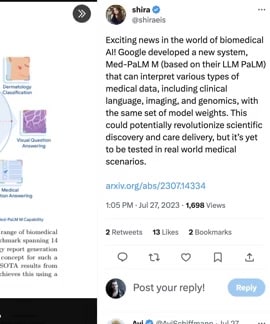How will AI impact doctors?
Sources:
AI is set to significantly impact the medical profession, enhancing diagnostic accuracy and efficiency while also posing new challenges in training and the role of doctors.
-
Diagnostics: AI has shown superiority in diagnosing complex medical cases from medical journals and imaging like mammograms, often outperforming human doctors [1] [2].
-
Training and Roles: There are concerns about AI impacting the training of new doctors. The fear is that reliance on AI for diagnostics may prevent doctors from learning essential thinking processes required for medical excellence [3].
-
Access and Efficiency: AI is predicted to dramatically lower the costs of expert medical advice, democratizing access to high-quality healthcare and possibly leading to widespread changes in medical practice and healthcare economics [1].
-
Integration Challenges: While AI has great potential, integrating it into the current medical practice faces regulatory, educational, and practical challenges. Professionals need to adapt to a new model where AI plays a significant role in diagnosis and patient care [4] [5].
-
Supplement not Substitute: AI will augment rather than replace human doctors, assisting with diagnostic processes and ensuring a high level of accuracy in patient care, but final decisions will remain the responsibility of human doctors [6].
Thus, AI is poised to transform the field of medicine, improving diagnoses and treatment while also challenging traditional training and the role of medical professionals.
RELATED QUESTIONS-



